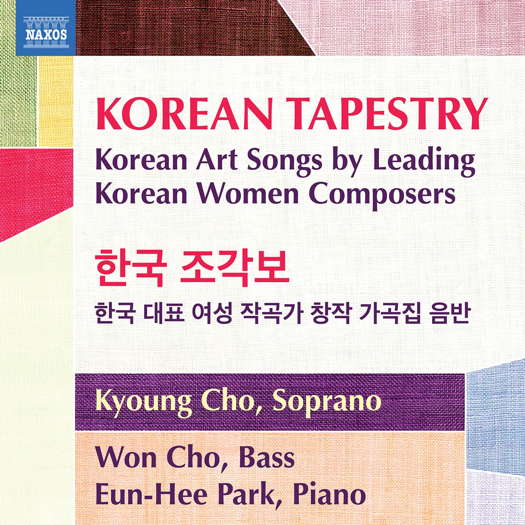 SPONSORED: Ensemble. A Great Start - Freddie Meyers' new opera A Sketch of Slow Time impresses Alice McVeigh.
SPONSORED: Ensemble. A Great Start - Freddie Meyers' new opera A Sketch of Slow Time impresses Alice McVeigh.
All sponsored features >>

Layers of Visibility
JOHN DANTE PREVEDINI considers an important release of music by female Korean composers
'... a prime example of grassroots leadership in the vital cause of making the field of music composition more open to the full spectrum of composers.'
Korean Tapestry: Korean Art Songs by Leading Korean Women Composers is the recent release by Naxos showcasing art songs by a variety of living Korean women composers, performed by soprano Kyoung Cho, bass Won Cho and pianist Eun-Hee Park. The sixty-eight-minute album is available in both CD and digital format, and it contains a bilingual booklet - in English and Korean - with liner notes written by the two singers as well as artist biographies and English text translations by the singers. (For this review, the pieces on the album will be referred to by their English titles.)
As indicated in the liner notes, the goal of this release is twofold. On the one hand, it is an introduction to the innovative Western Classical genre of the Korean art song, itself a descendant of the older Korean song genre of Ga-Gok. On the other hand, it is a document showcasing the work of contemporary women composers within the tradition and bringing to light their long-standing underrepresentation therein. To this end, the liner notes form an absolutely essential part of the album experience, as they elucidate both the challenges faced by composers pioneering uniquely Korean genres of Western Classical music a century ago and those faced by present-day women whose work in the genre now makes up both a majority of compositions and a minority of performances. In short, this album is more than simply a collection of music; it is an act of education and a call to social action.
The album features seventeen single-movement works by eight living composers written between 2004 and 2022, all spanning between two and five minutes in length and sequenced in a way that creates a listening experience with variety along a range of musical parameters. In terms of vocal range, the pieces vary among solo soprano, solo bass and duets. With respect to subject matter, the texts range from modern poetry on themes of love and nature to the settings of three traditional Korean folk songs that close the album. Though there is much diversity of musical personality to be found here, there are also some observable common stylistic traits that give the collection a distinctive identity as a representation of the Korean art song. Specifically, there is a noticeably strong preference for syllabic (rather than melismatic) settings of the Korean language that unfold at a slow and spacious pace in the voice. In addition, there is a preference for vocal lines with a stepwise structure and relatively few melodic leaps, underscored by a flexible harmonic structure that blends elements of neo-Romantic diatonicism, chromaticism and pentatonic scales.
The album opens with three pieces by Kyungshin Im: the duet 'You, My Courage' with text by Kyoung Cho, the soprano solo 'Letter of Autumn Rain' with text by Myungseo Lee and the rhythmically fluid soprano solo 'To You' with text by Hoseung Chung. Two more pieces by Im are featured on the album, the bass solo 'If You Would Come' on track nine with text by Yuseop Noh and the duet 'Lake of My Beloved' on track fourteen with text by Yangshin Oh. These pieces, taken altogether, show Im as a composer with a rather dramatic approach to text setting and a particular penchant for variety in rhythmic and registral structures.
Listen — Kyungshin Im: You, My Courage
(8.579129 track 1, 0:01-0:28) ℗ 2023 Naxos Rights (Europe) Ltd :
The second composer featured on the album is Namlin Lee, whose works here include the bass solo 'Night' on track four with text by Hoon Shim and the duet setting of the Korean traditional folk song 'Arirang' on track seventeen. These two pieces show her coloristic approach to harmony and piano writing, the latter of which makes use of a wide range of articulations and complex chord voicings. The next three pieces are all the sole representative works of their respective composers. On track five is the bass solo 'Poet Dong-Ju Yoon' by Boknam Lee with text by Seunghwan Yim, which is characterized by its high vocal range and the use of the piano for text painting. This is followed on track six by the duet 'Prayer No 5 "Love Is"' by Hae-Sung Lee with text by Namjoo Kim, which utilizes very bright timbres amid heavily textured piano writing. After this, on track seven, is the soprano solo 'My Little One' by Caroline Kyunga Ahn with text by Kyoung Cho evoking a lullaby, an especially poignant piece characterized by a blending of pentatonic scales with tonal mode mixture and unusually wide (for this genre) melodic leaps.
Listen — Caroline Kyunga Ahn: My Little One
(8.579129 track 7, 0:00-0:30) ℗ 2023 Naxos Rights (Europe) Ltd :
After this, on track eight, is Jeeyoung Kim's soprano solo 'Star Cultivating Child' with text by Geumchan Hwang. Her work additionally appears on track ten with the bass solo 'Because You Are Here' with text by Taejoo Na, which together with track eight showcase her expressive harmonic palette blending neo-Romantic and pentatonic devices. The next three tracks (eleven to thirteen) are by Jonghee Kang with text by Jung Ha Lee. These are the duet 'You And I', the soprano solo 'Spring Rain' and the soprano solo 'Two Ways'. All of these together show Kang's notable focus on interplay between the voice and the piano as an expressive device. The album then closes with two settings of Korean traditional folk songs for solo bass by Miran Kim with an innovative use of piano accompaniment, 'Nil ri ri ya' and 'Gyeongbokgung Palace Taryung', followed by the aforementioned 'Arirang' setting by Namlim Lee to conclude the sequence.
Listen — Miran Kim: Gyeongbokgung Palace Taryung
(8.579129 track 16, 0:00-0:30) ℗ 2023 Naxos Rights (Europe) Ltd :
This release is not only an introduction to the Western Classical music of Korea and the work of women composers within that tradition; it is likewise an effective case study in the challenge of successfully achieving layers of visibility while fighting against the prejudiced weight of historical precedent. While the creation of this Korean art song genre itself was fraught with adversity in the early twentieth century, as the liner notes tell us, this is only half of the story behind the music presented on this album. Kyoung Cho and Won Cho are very clear in their essay that women composers, despite leading the output of new Korean music in the Western Classical idiom, have been prevented from achieving comparable influence in actual music leadership roles in Korea due to traditional gender-related societal pressures. Specifically, they cite the impact of expectations that women leave the composition field in pursuit of a domestic life and the resulting predominance of men in positions of influence in Korea's leading musical institutions. Thus, projects like this present a rare and much needed opportunity to curate this repertoire and bring it to light, both for Korean and global audiences alike.
One of the most persistent challenges in the field of Western Classical music is the struggle to overcome the harm of rhetoric - whether inherited from tradition or innovated in response to new sociopolitical crises - that devalues the artistic contributions of people on the basis of their core demographic identities. Another is the challenge of inequitable access to compositional opportunities as a consequence of biasing systemic factors in broader society beyond the music field itself. A third issue is the conundrum that results when a traditional definition of 'prestige' involves achieving recognition from institutions which are themselves gripped by these aforementioned biasing forces, thus rendering the pursuit of traditional prestige into a process fraught with inequity. As a whole, Korean Tapestry provides a blueprint for tackling all three challenges simultaneously in its own way. Because of this, I consider it a prime example of grassroots leadership in the vital cause of making the field of music composition more open to the full spectrum of composers.
Copyright © 7 August 2023
John Dante Prevedini,
Connecticut, USA




